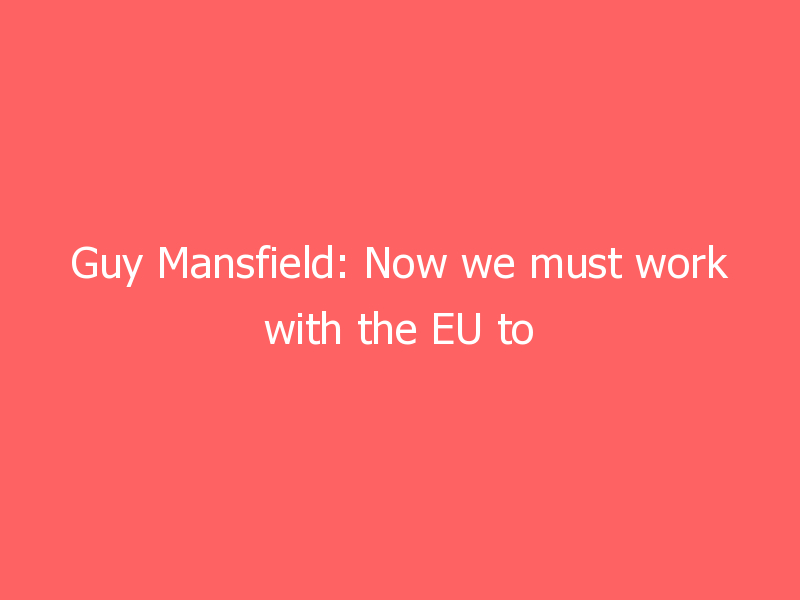Guy Mansfield: Now we must work with the EU to make Britain more safe and secure

Lord Sandhurst is a member of the Conservative European Forum (CEF) Justice and Home Affairs policy group. He is a past Chairman of the Bar of England and Wales (as Guy Mansfield QC), and current Chair of Research of the Society of Conservative Lawyers.
As Conservatives, it is our duty to ensure that the UK is neither less safe nor less secure outside of the EU. Both parties must think again and strengthen cooperation.
Understandably, political and media attention has been focused on the trade elements of the deal agreed between the UK and the EU on Christmas Eve. Now that we have left the European Union, it is time to review carefully all aspects of the Trade and Cooperation Agreement (TCA) to ensure it satisfies all of UK’s needs, beyond simply trade, tariffs and quotas.
My paper published by Conservative European Forum’s Justice and Home Affairs policy group – The Trade and Cooperation Agreement: The Justice and Security challenges ahead – examines, in detail, part three of the TCA, which covers UK-EU security cooperation.
Regardless of one’s view on Brexit, we can all agree, especially as Conservatives, that we do not wish to see the UK less safe or less secure as result of our changed relationship with the EU.
The paper raises a number of concerns. The statement released by the Home Office immediately following the agreement was optimistic. In fact, since 31st December 2020, the UK has been at a disadvantage. We have lost tools ‘to tackle serious crime going forwards’ and to ‘bring criminals to justice.’ The new extradition system will be less efficient.
First, the UK no longer has direct, real time access to two important centralised databases – SIS II, which holds records of stolen identity documents and wanted people, and VIS, which stores fingerprints and digital photographs of those applying for a Schengen visa. In 2019, UK police checked SIS II no fewer than 603 million times. These databases have been vital for UK police forces, notably enabling them to check if anyone is wanted or missing across the EU.
Secondly, we have lost our membership of Europol. As a consequence, the UK’s police forces have lost real time access to its databases. In fighting crime, speed is crucial. Crime and criminals are constantly evolving to evade detection. The UK will no longer be a member of Europol’s management board; it will not be able to exert the same influence over its future focus or prioritise areas of threat. As a non-Member State, the UK has lost the right to initiate operations such as Joint Investigation Teams.
Thirdly, the UK has left the European Arrest Warrant (EAW). This will result in slower and more complex extradition processes. Henceforth UK and EU member states can, if they choose, refuse to execute an arrest warrant for a number of reasons:
- In non-terrorist cases, on political grounds (the ‘political’ exception);
- On grounds that the requested person is a national of that executing state (the ‘own national’ exception).
- On the ground that the crime for which the UK seeks extradition is not a crime in the state from which extradition is sought (‘double criminality’). For such countries to agree to extradite, the crime must be an offence in that jurisdiction.
The political exception may well be an improvement. Not every member state is scrupulous in ensuring that decisions to prosecute are free from political interference.
But the reintroduction of the own national exception is bad news. Germany, Austria and Slovenia have already indicated that they will not extradite their own nationals. There are potentially a further 13 Member States which may likewise refuse to surrender their nationals. The UK will, in such instances, have to provide its evidence to such Member State, which (alone) will then decide whether to prosecute. Any trial will be conducted, if at all, in the Member State.
The double criminality requirement will slow down and even stop extraditions to the UK where the issue is raised. That too is bad.
It is not all bad news. The UK will continue to receive Passenger Name Record (PNR) data in advance of all arrivals by air. We shall continue to enjoy access to the Prum system (which makes accessible to EU Member States and the UK all national databases which store DNA profiles, fingerprints and vehicle registration data) and the European Criminal Records Information System (ECRIS), which permits access to criminal records of individuals on national databases across the EU. These are not gains; they simply maintain the status quo.
It is important to emphasise that the losses in security cooperation disadvantage the EU too. This is not a one-way street. The UK’s diminished role in Europol will create reciprocal dis-benefits to the EU. The UK’s loss of access to the EU systems means the EU loses access to the UK’s systems.
Our conclusions are intended to be constructive. However, it is plain that we have lost important tools for tackling crime. Looking to the future, the UK and EU member states must address further the security needs of our populations to go about daily lives free from avoidable harm. I urge both sides to continue to work together to strengthen security cooperation. The price of failure is too high, not just for the UK, but for the EU as well. This is not a debate about sovereignty, trade or tariffs. It’s about security. As Conservatives, the security of the UK and its citizens must always come first.
Originally found on Conservative Home Read More








